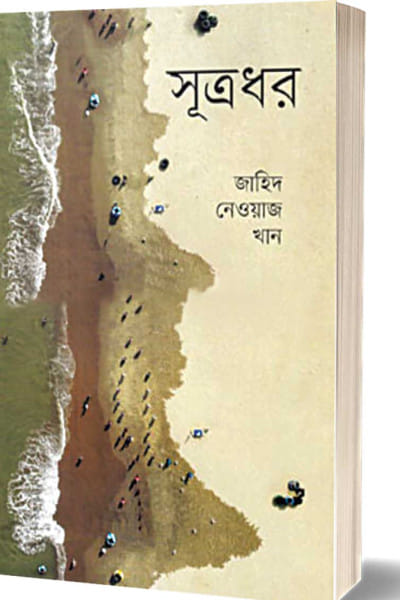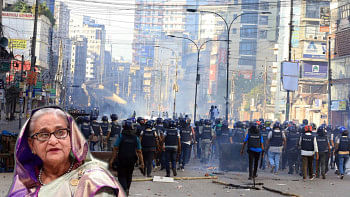Zahid Newaz’s ‘Shutrodhor’: A journey into our time

Shutrodhor (Abishkar Publication, 2021) starts with the disappearance of Anwar Ali. The sky-blue shirt that he wore on the day of his disappearance ends up at Rosario Automatic Dry Cleaners, linking the owner of the dry cleaner, Rosie, with Anwar Ali's son, Saikat Hassan. The story that starts with a mystifying air, evoking endless possibilities, ends with a heartbreaking reality we find ourselves getting strangely accustomed to.
Rosie has almost a similar story to tell. Her husband had suddenly disappeared one day nearly 30 years ago. She remembers the ache and hardship that she had to go through while bringing up her only son. The struggle was indeed colossal for her, so much so that she scarcely had any time to look for her husband, let alone unearth the people who had their parts to play in his disappearance.
After all these years, when she meets Saikat, a son looking for his father who has disappeared in much the same way, she instantly feels connected to his grief and refuses to stay on the sidelines any more. She decides on doing whatever she can to help Saikat find his father.
The search for Anwar Ali becomes a journey to unveil the truth. The truth that peels like an onion, revealing with each layer the political reality of our time. At one point, Rosie recalls her son commenting on how capitalism takes people away from their roots and provides them with new roots. Rosie, the mother who walks the earth on her own terms, defies the push to relocate and holds onto her grief, her old house and her old memories.
Hironpur, where Anwar Ali used to live, becomes a microcosm of the country that we live in—the country which at the age of 50 is passing through a precarious time.
Anwar Ali wrote continuously about the issues that plagued the people; he wrote against the powers that were because he was certain that it was his democratic right. He was a one-man army. When Rosie goes to look for him, Saikat expresses his worry about the repercussions of ruffling the feathers of politicians; in response, she rather nonchalantly tells him that surely they can't kill them. To a reader living in this time and age, Rosie's response may sound a bit too implausible. Or maybe not, maybe a little bit of courage is all that one needs to defy and challenge the rampant acts of irregularities and injustices.
Though the flap in the book says that it is a tale of a surrealistic land, Zahid Newaz's novel is rooted in reality. When Márquez was speaking to journalists in western countries after the release of the English translation of One Hundred Years of Solitude, it bothered him a little—and he found it amusing too—that they took the book to be completely magical. As Salman Rushdie later said in a tribute to Márquez, the reality of this part of the world doesn't work like that. Sometimes, using metaphors and magic is the only way we can tell our stories. But that doesn't make it less real, and if anything, the story becomes more alive.
Near the end, Rosie asks a fellow companion who accompanies her on this journey, "Would we just go on like this?" and the answer comes, "Yes, for now." After that, she sees an endless procession of sky-blue shirts fluttering in the air.
Upon finishing the book, I also said, yes, for now.
Sumaya Mashrufa is a writer and she hopes to tell the stories of people who quite forcibly live in her head. In her spare time, she takes pictures creating a visual diary of this time.

 For all latest news, follow The Daily Star's Google News channel.
For all latest news, follow The Daily Star's Google News channel. 



Comments